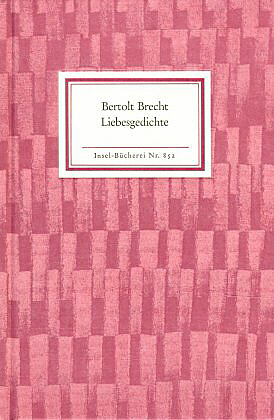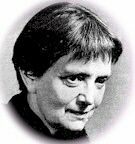| ELISABETH HAUPTMANN (1897-1973) | |
|
|
Elisabeth Hauptmann was born
on 20 June 1897. Her father was a medical doctor. She received a teacher's
education and then teached in a town near the Polish border. In 1922 she
moved to Berlin and supported herself as a secretary. She met Brecht for
the first time in November 1924. And starting 1925, she worked as Brecht's
"editor" (Lektorin) and collaborator in preparation of Mann ist Mann
and Die Hauspostille for the Kiepenheuer Verlag. While she remained
on the payroll of Kiepenheuer, she also assisted Brecht on his other projects.
Her duties included translation, research, and preparation of the typescripts
of short stories, poems and songs. It was not until 1927, when Brecht terminated
the contract with the Kiepenheuer, that Hauptmann was dropped from their
payroll and started her career as a freelance translator and story writer.
Her own work was published in various magazines during this period. She
also translated the American writer Ferdinand Reyher's play Don't Bet
on Fights (Harte Bandagen) and arranged its production in Berlin. The
three remained close contact afterwards and the friendship later proved
to be an intergral part of Brecht's American career.
Up until 1933, she was intensely involved in various projects headed by Brecht. As she was interested in the history of the Salvation Army and the economic issues surrounding that organization, archival documents indicate her major involvement in Der Brotladen, Die heilige Johanna der Schlachthöfe as well as her own short story "Bessie Soundso." As a translator, she introduced Brecht to the British writer Rudyard Kipling and her translation of the _Beggar's Opera_ by John Gay laid the foundation for Die Dreigroschenoper. The success of Die Dreigroschenoper at the box office subsequently led to the spinoff (with the Salvation Army thread) Happy End on which she was responsible for the plot and Brecht, the lyrics. Brecht, as the Happy End failed to grasp the imagination of the public, has already turned his attention to a new medium, namely the Lehrstück. In 1929 Kurt Weill suggested to Brecht to use Hauptmann's translation of the Japanese No play Taniko ("Taniko oder der Wurf ins Tal," appeared in Der Scheinwerfer, from Arthur Waley's English translation¹) as the basis for their next project, Der Jasager. At about the same time Hanns Eisler also proposed to Brecht to set the play in a contemporary setting. The two projects proceeded side by side with the intention to participate in the "Neuen Musik Berlin 1930." It is also worth noting that Hauptmann has translated 7 other pieces from the Waley collection. And this subsequently led to her radio play Die Rollen des Schauspielers Seami. Related to their interests in this new genre, Lehrstück, Hauptmann also translated a Chinese Yuan zaju (play) from a French version, Ho-Han-Chan ou la tunique confronté. The German translation, Zwei halbe Mäntel, would then form the basis for the intended coupling piece Die Ausnahme und die Regel and the unfinished Die Regel und die Ausnahme. It is also believed Hauptmann had an important role in the shaping of Die Mutter (after Gorki). When Brecht fled Germany after the Reichstag Fire, Hauptmann stayed behind to arrange the shipment of Brecht and her own manuscripts. In summer of 1933, she travalled to Denmark to visit Brecht. After her return to Berlin in November, she was arrested. Only through the intervention of her lawyer was she freed again, and she then moved on to Paris. In the meantime, she helped put together the second collection of Brecht's poems Lieder Gedichte Chöre, which appeared in 1934. At the beginning of 1934, she sailed to New York, and later to St. Louis to stay with her sister. Afterwards her role as a Brecht collaborator would continue through extensive correspondences (mostly from Hauptmann to Brecht). These include an unfinished project about Charles the Bold, and Die Spitzköpfe und die Rundköpfe (based on Shakespeare's Measure for Measure), as well as other suggestions for productions in America. When Brecht arrived in New York for the Theater Union producion of The Mother, Hauptmann also travelled there in order to facilitate the communications. In St. Louis, Hauptmann has attempted to establish herself as a writer. And she, at the same time, enrolled in a graduate program in French as well as teached at a high school. She was also active in anti-Nazi movements. A group of six poems with the title of "Sechs chinesische Gedichte" was published in Das Wort in 1938. The poems, translated from Arthur Waley's A hundred and Seventy Chinese Poems, probably were initiated with Hauptmann's original efforts when she was also studying No-theory through the same scholar. This collection later expanded and were again published in the tenth volume of Versuche, with credits to Hauptmann, in 1950. In 1940 she began to contact various German refugees in preparation for Brecht's emigration to the US. She moved again to New York in 1941 and started a relationship with the German socialist Horst Baerensprung, writing materials for anti-Nazi radio broadcast as well as other literary projects. Now even that she was busy in the matters with the "Council for a Democratic Germany," she remained contacts with Brecht to give advice on several works. After 1946 when Baerensprung returned to Germany, Hauptmann's involvement with the playwright would intensify. Brecht was relying on her to organize a collection of his plays to be published in English and to coordinate other translations authorized by Brecht. In 1946 she also moved to Los Angeles. The collaborations in California involved some film scripts, and an abandoned opera project, Reisen des Glücksgotts. She also pursued her career as a writer in the film industry. One film script, Olga or No Wall Too Thick, is extant with her signature and another writer. The working relationship, after her return to Germany in late 1948, was not as extensive as the previous years, while her husband, Paul Dessau to whom she was married two years before, has set various texts to music and was working on Mother Courage and Her Children (started in 1946). Brecht, on the hand, was preoccupied in the establishment of the Berliner Ensemble as well as commisions from the newly resumed Salzburg Festival. When Hauptmann finally arrived in Berlin on 15 February 1949, she was giving the responsibilities to resume the publication of Versuche (now by the Suhrkamp Verlag). Correspondences from this period also indicates that she was involved in Brecht's new project Till Eulenspiegel, while she was officially working for the DEFA. However, Hauptmann's participation in the productions of the Berliner Ensemble would increase dramatically as the new company continued to expand its repertoire. In 1954, she was finally made an official member of the Berlinher Ensemble as "literarische Mitarbeiterin und Dramaturgin." In this last phase of Brecht's life, her contributions were twofold. On the one hand, she was responsible for the editing of the collection of Brecht's writings, with the very difficult task of sorting out the various corrections and amendaments on the manuscripts throughout the years. Stücke would start to appear in 1953 and later on Gedichte would be published in 1960-1965. Eventually, the very influential Gesammelte Werke was published in 1967 under her supervision, with the addition of Brecht's output in prose. On the other, she was involved in the dramaturge work for the Berliner Ensemble, and was highly regarded by her colleagues. She contributed extensively to Pauken und Trompeten, Don Juan, Hirse für die Achte, Optimistische Tragödie and Die erste Reiterarmee. She accompanied Brecht to Milan for the Giorgio Strehler production of Die Dreigroschenoper in February 1956. In addition, she was also working on Tanker Nebraska by Herb Tank, Lillo Hermann by Friedrich Wolf and translanted Volpone by Ben Jonson as well as Zwei Herren aus Verona (Shakespeare). She died on 20 April 1973.
1. Brecht, Bertolt. Der Jasager und Der Neinsager: Vorlagen, Fassungen, Materialien. Ed. Peter Szondi. Frankfurt am Main: Suhrkamp, 1966. |
| Elisabeth Hauptmann vertraute den künstlerischen
und politischen Wirkungen Brechts. Wo sie konnte, trug sie dazu bei, sie
zu intensivieren. Ihre Beratung aller Aufführungen Des Berliner Ensembles
von der Textfassung bis zur Realisierung auf der Bühne hat Qualitäten
provoziert. Ihre Ratschläge fanden ihren Niederschlag in ungezählten
wissenschaftlichen Arbeiten über Brecht. Aber immer wieder suchte
sie den Kontakt mit den jungen Menschen. Als es ihr gesundheitlich noch
gut ging, interessierte sie sich besonders für die jüngsten Zuschauer
des Berliner Ensembles, die Schüler, und brachte ihnen, auf ihre Weise,
Brecht nahe. Bei ihr lernten sie, daß man sich in Zusammenhang mit
Brecht vier Begriffe mit F einprägen muß, aber »andere
als einst beim Turnvater Jahn, nämlich: Fortschritt, Friede, Freundlichkeit,
Fleiß«.
--Werner Hecht
|
|

Brecht, Bertolt. Liebesgedichte. Ausgewahlte von Elisabeth Hauptmann. Inselbucherei, Nr. 852. Frankfurt a. M: Insel, 1966. 62 S.. ISBN: 3-458-08852-0. |
|
